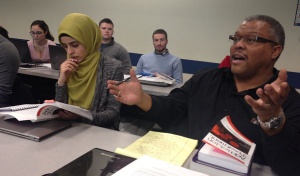

Confidently standing in front of his “HHS 370: Medicine and Addiction I” classmates, Joe Popa, a Marine veteran, talked about substance abuse treatment methodologies and motivational theories.
Popa would know. He’s been in recovery for more than a year.
“I sold my girlfriend’s bracelet for opiates,” the 25-year-old shared after the class. “When it hit me what I did, I knew I needed to change, I needed help.
“It was the first time I really saw the affects of my addiction. I didn’t like it. Just because I live in a rough neighborhood and I’ve seen a lot of terrible things, doesn’t give me the right to hurt people.”
Through a trusted clinician and family support, Popa found his road to recovery. And now he wants to guide others—especially inner city residents and service persons—to find theirs as well.
Popa, along with 19 other students, is enrolled in University of Michigan-Dearborn’s Addiction Studies Certificate program.
The 18-credit program, new to campus this academic year, prepares students for work in the field of substance abuse, like counselors, researchers, criminal justice professionals and clinical supervisors. And upon completion of the program, recovering students will be equipped to apply for certification as a peer mentor.
Julie Roddy, associate professor of health and human services, created the certificate. She said the program engages with the Detroit Metropolitan community by having students and community members learn from each other and giving educational tools for this issue.
According to the National Survey of Drug Use and Health, 2012-2014, substance abuse percentages have increased in nearly all categories—from alcohol to sedatives—for ages 12 and older.
Roddy said this trend can be seen in the Detroit area too. And she wants to equip students with the skills to aid those in need.
“We experience all of the ailments associated with substance use in our region and most of our students stay local. They are going to be out in our neighborhoods. It's important that we train our students on how to be compassionate and on how to help,” said Roddy, who mentioned that the class is at capacity.
Back in the Wednesday night class, HHS 370 Lecturer Ural Hill, a licensed professional counselor from the Detroit-based Self Help Abuse Rehabilitation (SHAR) organization and his own private practice, continued the dialogue on motivation.
He said it’s key to help discover and identify the reasons to stay sober.
“You find the little things to excite them,” he said. “You find those little doors to open that will empower the beautiful things that are inside them.”
Hill, a 1983 UM-Dearborn alumnus, said he’s honored to teach the inaugural class for the certificate. He shared with his students how essential this work is.
“As Detroit experiences it's rebirth we will need a mentally healthy, sober and high functioning populace. We need a new generation of dedicated addiction professionals to prevent, treat and educate Detroiters about substance abuse to promote optimal health,” said Hill, who’s worked in academia for 25 years and has served a social worker in Detroit.
Popa said he’s doing well in his sobriety and wants to help, especially because the justice system is starting to move from incarceration to the rehabilitation process.
“People struggle because they can’t find the right kind of treatment or the right doctor. I’ve been there,” he said. “I want to help people get back on track. Getting connected to the right support gives you that chance for a new life.”




